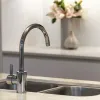There are many ways to accidentally damage your plumbing system.
What’s weird is that some activities that are objectively harmful for your pipes are things that many people think are helpful. Wild, but true!
However these plumbing rumors get started, they’re just that. Rumors. They’re mythologies. Fictions. Wishful thinking in action.
And they can cost you some serious money.
Let’s take a look at five of the most common plumbing myths. All of these misconceptions could lead to a more expensive, inconvenient problem than the one you were trying to solve in the first place.
1. It’s ok to flush “flushable” wipes.
We can’t count the number of times we’ve been called to inspect a clogged sewer line and found clumps of wet wipes blocking the pipe.
The packaging might say they’re flushable. But flushing them is a really bad idea.
Wet wipes, baby wipes, and their brethren simply do not break down the way toilet paper does. They stay solid, and they can snag on tiny rough areas inside your sewer pipe.
Or they’ll just stick to the pipe lining and pile up on one another.
Regardless, flushable wipes cause lots of sewer line blockages. It’s just not a good idea to flush them.
Using disposable wipes is fine, but be sure to throw them away. Or if you don’t want to do that, there’s always toilet paper.
2. Chemical drain cleaners can fix clogs.
Here are two things that are true about chemical drain cleaners:
- They probably won’t dissolve the clog in your drain.
- They can damage your pipes, leading to corrosion and sewer line leaks.
Simply put, chemical drain cleaners are a bad idea.
We know it’s tempting to use the thing that claims to be a quick fix for a clogged drain. But if it’s a serious clog, the Drano isn’t going to help.
You’ll need to plunge it or bust it up with a plumber’s snake.
And if the clog is in your sewer line, no chemical drain cleaner is going to work.
Products like Drano and Liquid Plumber can corrode galvanized steel pipes, accelerating their deterioration. And if you’ve got cast iron pipes, chemical drain cleaners can eat away at the inner coating that prevents the iron from rusting.
Then when it rusts through, you’ve got a sewer pipe leak. Ew.
Just say no to chemical drain cleaners! Opt for physically moving or obliterating the clog instead.
3. It’s ok to put _______ down the garbage disposal.
There’s all kinds of stuff we could use to fill in the blank! Here are a few:
- Cooking oil
- Potato skins
- Fruit peels
- Vegetable peels
- Onion skins
- Eggshells
- Coffee grounds
Basically, anything that’s not super small and super soft is unsuitable for the garbage disposal.
Little bits of food left on your plate from eating are fine. Large remnants of a peeled cucumber? Not so much.
Cooking oil is probably the worst offender of all. It might still be warm when you pour it down the drain, but it cools down quickly inside your sewer pipes.
As the grease cools, it congeals on the inner lining of the pipe. Before you know it, you’ve got slow draining sinks all over the house. Or, worse yet, a full-blown sewage backup emergency!
And while they’re less likely to clog your pipes than, say, tough potato skins, eggshells and coffee grounds really have no business in your kitchen drain.
There’s a funny myth (a sub-myth of the myth we’re discussing?) about eggshells sharpening your garbage disposal blades. Simply put, they don’t. But they will clog your pipes!
Many people also put coffee grounds in the garbage disposal because it makes it smell better. It’s true that it makes the drain smell a little better, but the risk of a clog is real! Just throw them away or compost them instead.
They’ll make your trash can smell nice, too.
4. Slow drains are normal in an older home.
Nope. A slow drain is a sign of a clog.
And if you’ve got more than one slow drain, that clog is probably lurking deep within your sewer line.
Even thirty or more years ago, plumbers and builders knew how to install drains that didn’t back up or drain slowly. Slow drains are never normal, regardless of the age of the home.
5. Small leaks don’t matter.
They matter when they spike your water bill!
Many people tolerate leaky sink faucets or shower heads, thinking they’re not such a big deal.
But over time, they could cost you a lot. Remember: Every drop is water you’ve got to pay for!
Also, if it’s as simple as replacing a washer or a sink aerator, this is a cheap DIY plumbing fix that’s well worth doing.
But what about other leaks? Say you notice a little water seeping out under your sink. It’s coming from the supply, but it’s not soaking your cabinets or anything. You figure it’s no big deal.
Actually, this is a really huge deal.
A small leak at a supply line could indicate a washer or o-ring that’s starting to fail. Once it fails completely, you won’t have a small, negligible leak anymore.
You’ll have a flood.
By the time you make it to your main water shutoff valve (you do know where yours is, right?), your floors and cabinets might be severely damaged.
So don’t ignore the small leaks! A good way to avoid this nightmare scenario is via regular preventative plumbing maintenance.
Conclusion: Be skeptical of old wives’ tales about plumbing
And be wary of certain kinds of marketing!
The people who print “flushable” on the wet wipe packages probably mean well, but they’re just… wrong. Ditto for the chemical drain cleaner companies.
If you’re concerned about your plumbing, have a burning question, or need someone to help bust a clog, PV Heating, Cooling & Plumbing can help!
Our team provides comprehensive plumbing services throughout Metro Atlanta.
Give us a call today at (404) 798-9672 or schedule service online!




